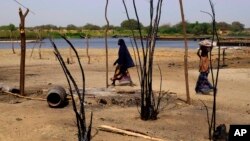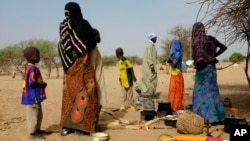The United Nations warns that conditions in Central Africa's Lake Chad basin are threatening the lives of hundreds of thousands of people, among them many children. Food is short throughout the region, which has been ravaged by the Boko Haram insurgency.
Millions of people living in the basin are in the grip of an ever-deepening humanitarian crisis brought on by violent conflict, abject poverty and climate change.
More than 20 million people live in areas around the lake in four countries — Cameroon, Chad, Niger and Nigeria. The United Nations says nearly half of them are in need of emergency aid.
Toby Lanzer, U.N. assistant secretary-general and regional humanitarian coordinator of the Sahel, said an estimated 6.5 million people in the region are food insecure — barely surviving on one meal a day.
He said the ever-growing number of severely malnourished children is of particular concern. Across Lake Chad, he notes, there are 568,000 severely malnourished children, the bulk of them in northeast Nigeria.
“We know that in the next 12 months, 75 [thousand] maybe as many as 80,000 children will die in the northeast of Nigeria unless we can reach them with very specialized therapeutic food.”
Lanzer told VOA the violence perpetrated by Boko Haram militants in northeast Nigeria and in the region is the single biggest factor in creating this emergency.
“People were displaced, forced from their land. They could no longer tend to their livestock. This has really paralyzed things for the population across the region," he told VOA. "Trade itself was stopped because of the security operation to counter Boko Haram ... I’ve worked in many crises settings, [and] the scale and the depth of suffering that I have seen is unparalleled in my experience.”
Lanzer said U.N. operations in the Lake Chad basin are in a deep financial hole and the international community must come up with the money to support humanitarian activities.
He said U.N. agencies are seeking $739 million to deal with the crisis. But the response has been tepid with only $197 million — less than one third of the total needs — has been raised.





